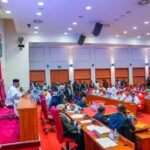Climate Change Impact Nigeria
Unmasking the Devastating Climate Change Impact in Nigeria
Climate Change Impact Nigeria: Nnimmo Bassey’s urgent call for climate action and environmental justice resonates on a global scale.
Climate Change Impact on Nigeria: Nnimmo Bassey’s Urgent Call for Action
Nigeria, a country renowned for its cultural diversity and vibrant economy, has, in recent decades, faced dire environmental challenges, largely due to oil production. The Niger Delta, a region bearing the brunt of extensive pollution, has been marred by the release of an estimated 9-13 million barrels of oil between 1958 and 2020. As if this wasn’t enough, the devastating effects of climate change, including flooding, reduced rainfall, and rising temperatures, have added to the nation’s woes. These climatic changes have hampered food production, particularly in the face of a surging population.
In light of this, Nnimmo Bassey, the Executive Director of the Health of Mother Earth Foundation (HOMEF), offered critical insights during an interview with Nigeria NewsBurrow News Network, following the Africa Climate Summit in Nairobi. Bassey’s message is clear and resounding: “Climate change is a life or death matter and should not be seen as an opportunity for politicking or for economic speculation.”
One key factor exacerbating environmental issues in Nigeria is the discovery of crude oil in commercial quantities. This event has led to significant problems across major oil exploration states, with the Niger Delta region being the most severely affected. Over the past half-century, a host of environmental health risks have surged, thanks to population growth and the expansion of the oil industry. From water and air pollution to oil spills, inadequate solid waste management, poverty, deforestation, desertification, wind and coastal erosion, flooding, and land degradation, the Niger Delta has experienced an environmental crisis of unprecedented proportions. The consequences have been devastating for food security and biodiversity, particularly in major cities and the Niger Delta.
What makes this situation all the more ironic is that the Niger Delta, often referred to as the “ecocide” of the world, houses the majority of Nigeria’s oil wells and fossil fuel companies. While these resources are instrumental to the region’s economic development, the environment has borne the brunt of extensive degradation and pollution. Both local and international concerns have been raised, prompting environmentalists to label the area as a global example of “ecocide.”
The consequences of this environmental devastation are felt by residents across the region. Black soot pollution has plagued the atmosphere, causing severe respiratory problems. Frequent oil spills, often orchestrated by oil thieves due to inadequate pipeline maintenance, have contaminated major rivers and rendered extensive farmlands unproductive. As a result, livelihoods are threatened, and access to clean drinking water has become a rarity. Excessive pollution has also made fishing activities across riverine communities in the Niger Delta increasingly challenging.
The scale of the oil spills in the Niger Delta is staggering, with an estimated 9-13 million barrels spilled between 1958 and 2010, and this is considered a conservative estimate. According to a recent report by the Bayelsa State Oil and Environmental Commission, this is equivalent to a major oil spill on the scale of the Exxon Valdez disaster occurring every single year for half a century. Shockingly, just five major international oil companies, namely Shell, Eni (Agip), Chevron, Total, and ExxonMobil, are responsible for the vast majority of oil production in the Delta, as well as 90% of the spills in recent years.
Meanwhile, the negative impacts of climate change and shifting weather patterns have become increasingly evident across Nigeria in the last decade. This includes devastating floods in several regions, declines in rainfall in the northeastern and southern regions, and rising temperatures nationwide. These climatic changes have led to reduced agricultural productivity in major food-producing states, occurring simultaneously with a significant population spike over the past decade.
So, what prompted Nnimmo Bassey to become a climate activist? His journey is characterized by a commitment to justice, a fundamental principle that transcends every aspect of his life and work. He began as a commentator and humorist on sociopolitical issues before being drawn into the human rights community during Nigeria’s days of military dictatorship. As he campaigned for human rights, he came to the realization that environmental rights are intrinsic to the right to life. The massive ecological and human rights abuses witnessed in oil field communities in the Niger Delta reinforced the importance of environmental rights. As the abuses and pollution by oil companies mounted, Bassey recognized the looming issue of climate change, which was often overshadowed in Nigerian discourse.
One of the major climate change issues that Bassey and his team campaigned against was routine gas flaring, the illegal venting of gas associated with crude oil extraction. They also initiated the “Leave the Oil in the Soil” campaign, started 30 years ago under the auspices of Oilwatch International. These initiatives spotlighted the existential threats posed by climate change, attributing them to the actions of polluting rich nations and corporations, thereby elevating the justice aspect of the campaign.
Bassey also pays tribute to Ken Saro-Wiwa, who laid the foundation for radical environmental justice campaigning in Nigeria. Saro-Wiwa’s struggles to halt the despoliation of the Ogoni environment were tragically cut short when he was murdered by the state. Nevertheless, the seeds he sowed continue to grow, inspiring countless others to advocate for environmental justice.
Bassey’s message to Nigeria and the world is unequivocal: Climate change is a matter of life and death, and it must not be exploited for political or economic gain. The shift towards voluntary emissions reduction and the abandonment of justice principles, such as “common but differentiated responsibilities,” have hindered progress. The Paris Agreement, with its emphasis on nationally determined contributions, has fallen short, with nations overshooting the temperature targets it established. Bassey criticizes the concept of voluntary NDCs as a bitter joke.
The interview with Nnimmo Bassey occurred following the inaugural Africa Climate Summit in Nairobi, where African leaders adopted a new climate pact. The summit aimed to create a just multilateral development finance architecture that would free Africa’s economies from “odious debt and onerous barriers to necessary financial resources.” However, Bassey found the messages emerging from the summit deeply troubling. The draft declaration hinted at a lack of understanding of the critical climate issues, or, worse yet, suggested that leaders were appeasing polluters in the hopes of receiving token gestures. Many of the speeches centered around making Africa a continental carbon sink, alluding to the gaining of carbon credits.
The African leaders’ claims regarding vast areas of uncultivated land have raised concerns about the continent embracing green colonialism. Although the declaration acknowledges that 60% of the population consists of small-scale farmers, little is mentioned about supporting them or promoting agroecology as a genuine climate solution.
However, the promises made by leaders at the summit have raised more alarm than hope. It was expected that leaders would emphasize moving away from fossil fuel dependency and accelerating investment in renewable energy systems. Yet, the reality on the continent indicates a relentless assault on pristine ecosystems, many of which are designated as nature reserves or World Heritage Sites. Areas such as the Saloum Delta in Sénégal, the Okavango Delta in Namibia, the Lake Albert region in Uganda, the Virunga Park in the Democratic Republic of the Congo, and, of course, the Niger Delta, are all under threat. The focus on fossil fuel resources as a means to combat energy poverty is misleading, as most of the infrastructure serves the exportation of crude oil and fossil gas. The overwhelming impression is that these actions are not primarily in the interest of the people.
The newly adopted Nairobi pact, Bassey believes, will influence some climate action, including an increase in renewable energy in the energy mix. However, it is also likely that the continent will experience more of what Bassey refers to as “false solutions” within the framework of the UNFCCC. This could involve land and forest grabs through carbon trading deals, allowing polluting nations and corporations to offset their pollution in Africa by planting trees. This notion is emblematic of market environmentalism, marked by its bitter cynicism.
In the world of climate activism, Bassey emphasizes the need to address the root causes of the problem. Effective activism is rooted in knowledge and an understanding of the challenges within a specific context. It requires learning from communities rather than assuming superior knowledge. Bassey firmly believes in creating space for people to speak up for themselves, ensuring that messages are based on facts and real stories about real people. Effective activism involves activists staying in the background while communities lead the way.
As for the upcoming COP28 (the 28th UN Climate Change Conference of the Parties), Bassey cautions against expecting a major impact. The conference is unlikely to produce a resounding success, given the continuing lack of commitment to financing climate action and the ongoing reliance on fossil fuels. What Bassey anticipates is that COP28 will provide a platform for meeting with civil society groups and progressive leaders from around the world. It will serve as a space to demand climate debt payment and the recognition of ecocide as a crime akin to genocide and crimes against humanity.
In conclusion, Nnimmo Bassey’s work as a climate activist has far-reaching implications, transcending national borders. His fight for climate justice and the rights of communities has inspired a global movement. Bassey’s work may not be the silver bullet to solve the world’s climate crisis, but it plays an essential role in advancing the cause of environmental justice. While the world watches with anticipation, it is the efforts of individuals like Bassey, fighting for justice and the planet, that continue to drive momentum towards a more sustainable future.
Join the Conversation
What are your thoughts on Nnimmo Bassey’s call for climate action and environmental justice in Nigeria? How do you view the challenges faced by the Niger Delta and other regions affected by climate change and pollution? Share your insights and opinions in the comments below and be a part of the conversation.
[ad_1]
Unmasking the Devastating Climate Change Impact in Nigeria
As we delve deeper into the profound impact of climate change on the Niger Delta and the urgent need for sustainable environmental practices, it becomes increasingly evident that taking action is the need of the hour. The story of the Niger Delta, fraught with ecological degradation and pollution, serves as a stark reminder of the challenges our planet faces. But, there’s hope on the horizon, and it comes in the form of solutions that align with the essence of environmental justice and resilience.
One powerful solution we must consider is harnessing the energy of the sun. Solar panels have emerged as a beacon of light, offering a cleaner, more sustainable source of power. These panels not only help reduce our carbon footprint but also provide a practical solution for the energy needs of communities affected by environmental crises. By incorporating solar panels into the revitalization of regions like the Niger Delta, we can take a significant step towards restoring the delicate balance between nature and human prosperity.
In the pages that follow, we’ll explore how solar panels can contribute to the restoration of regions grappling with environmental devastation while reducing the global reliance on fossil fuels. Let’s embark on this journey together and discover the potential of solar panels to be a catalyst for change, ensuring a healthier, more sustainable future for our planet and its inhabitants.
[ad_1]
Shop Products On Amazon










[ad_1]
Shop Products on Ebay









[ad_1]
Trending Similar Stories in the News
Stop playing politics with climate change: Q&A with Nigeria's Mongabay.com...
Financing Net Zero Carbon Buildings in Nigeria - CPI Climate Policy Initiative...
[ad_1]
Trending Videos of Climate Change Impact Nigeria
Nigeria: Oil pollution in the Niger Delta | Global 3000
Shell court case: Oil giant accused of pollution in the Niger Delta
[ad_2]
Similar Posts, Popular Now
Unearthing the Mystery: Kaduna Eastern Bypass Investigation Reveals Shocks and Surprises
Cracking the Code: Why Nigerian Food Export Rejections Are Soaring
Ogun State Palliatives Distribution Controversy: Unmasking the Truth Behind the Viral Video
Central Bank Policies: New CBN Governor Shakes Up Nigeria’s Financial Landscape
PDP National Secretary Controversy Unveiled: Wike’s Bold Stand Shakes Party Leadership






Unmasking the Devastating Climate Change Impact in Nigeria
💬 What’s your take? Drop a comment below! ⬇️
#BreakingNews #LatestUpdate #StayInformed
📖 Read More: https://tinyurl.com/2y5hxc3p